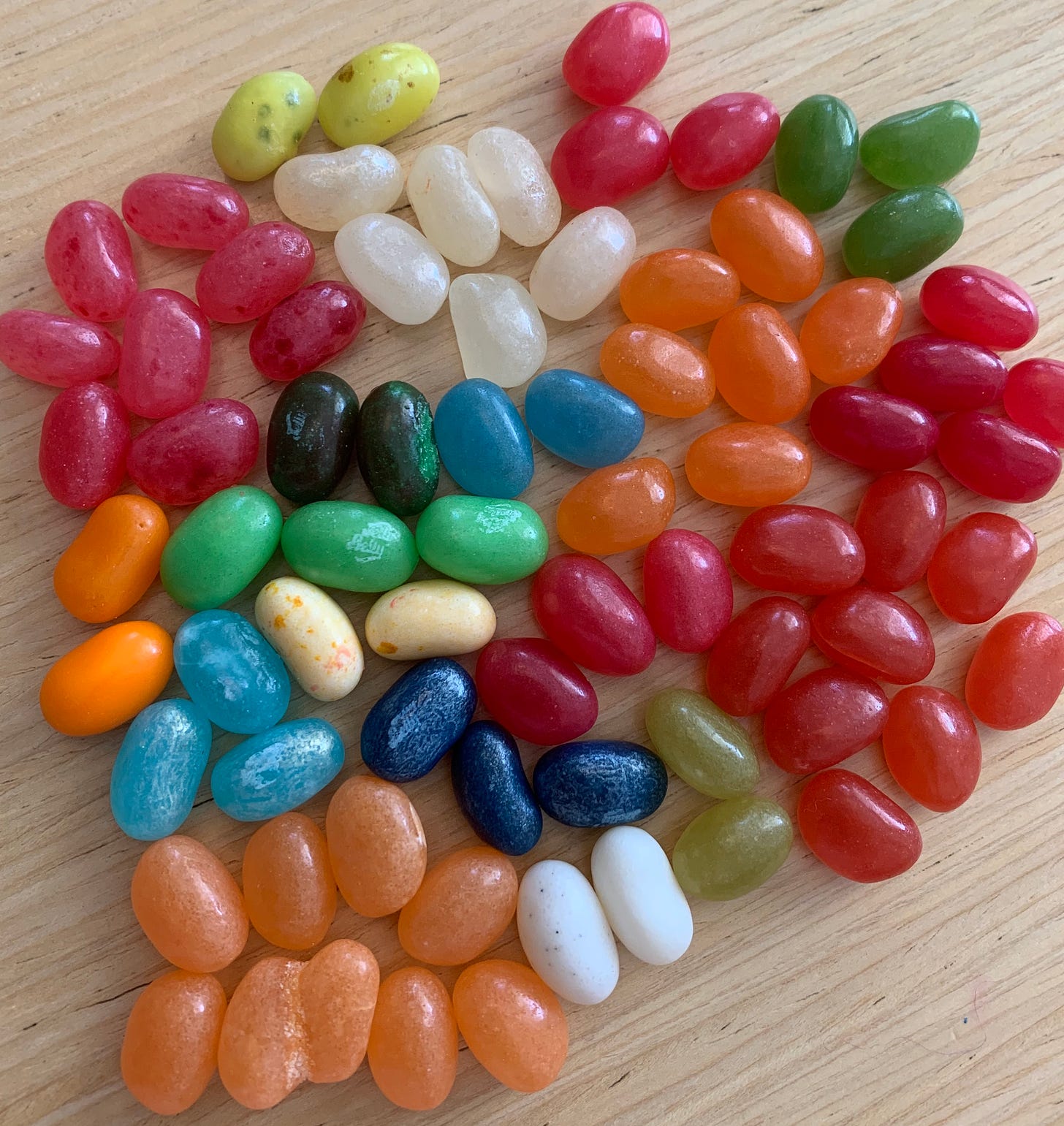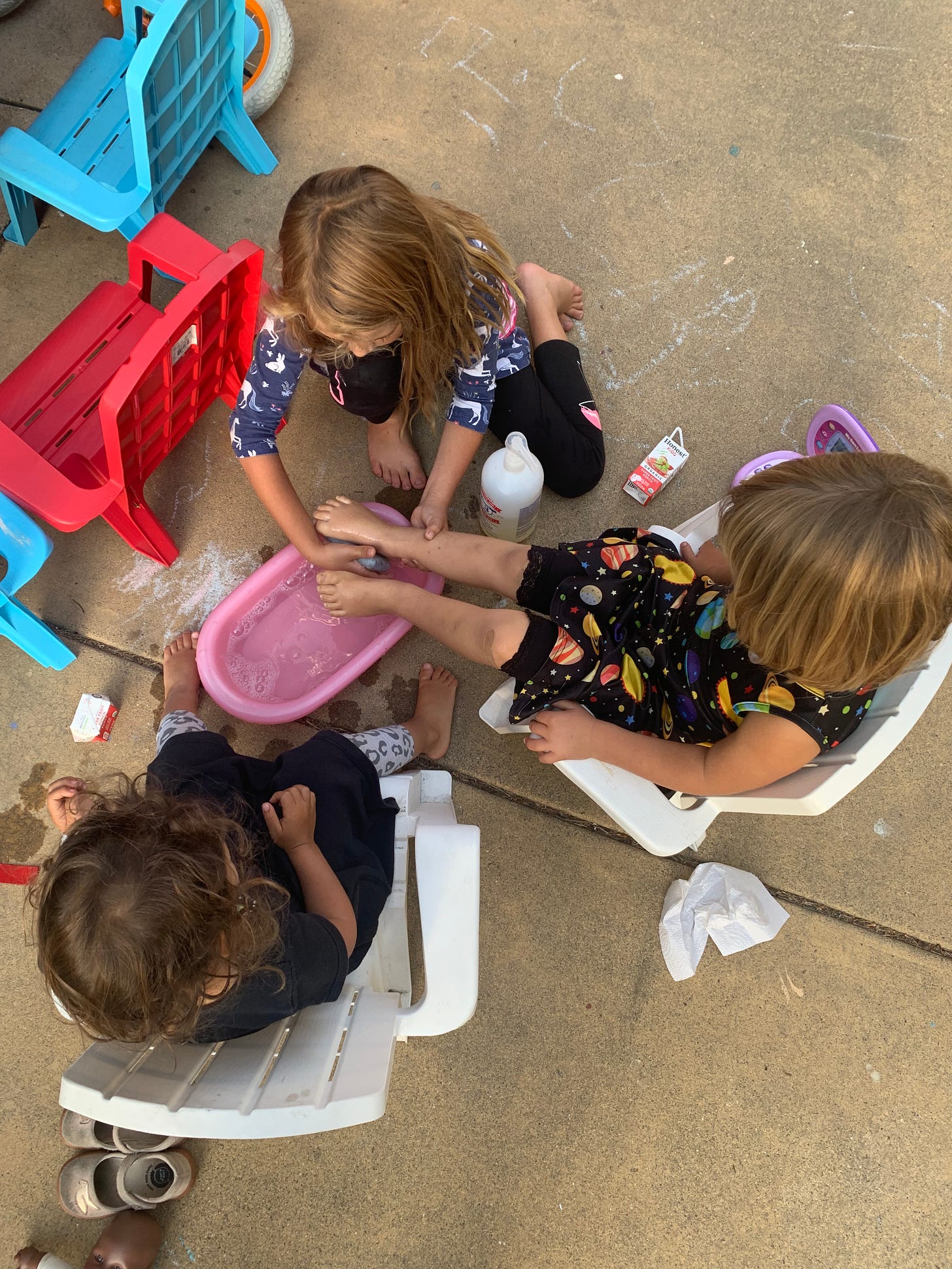The frenzy of egg hunting, tossing, dropping, and dyeing has come and gone. The heads have been eaten off of the top of the chocolate bunnies. Maya, my older daughter, has carried on the sacred tradition of older children by dominating during all Easter activities and making her little sister feel inadequate. Stella, my younger daughter, has done what younger children do, what I did: cried. The jelly beans are stuck to the backseat of the car. The translucent plastic grass is strewn through out the kitchen. All is as you would expect these days after our very commercialized Easter.
But what exactly was that all about? A child, my child—who is growing up in an agnostic household—might understandably ask. They didn’t. I think they were too high on sugar, but they could have. And what would I have said?
Here’s the latest statistics on religious affiliation in the U.S. from Pew Research Center:
3 in 10 U.S. adults are religious “nones” – people who describe themselves as atheists, agnostics or “nothing in particular” when asked about their religious identity; this population is growing
self-identified Christians of all varieties make up 63% of the adult population; this population is shrinking
6% of adults identify with non-Christian faiths—1% who describe themselves as Jewish, 1% who are Muslim, 1% who are Buddhist, 1% who are Hindu and 2% who identify with a wide variety of other faiths
One could read these statistics and assume that us “nones” are really treading in troubled water. We’re supposed to raise kids with values, but without a sacred text or religious rituals, without authority figures or decrees, how are we to know which morals to story for our children?
In some ways, that’s true. Parents like me are navigating more ambiguous terrain than parents with a solid faith tradition. But I don’t think it’s as simple as we might think it is. The question that faces those of us who are parents and fall outside of any obvious religious tradition (and it appears that there are more of us each year) is not unlike the question that faces all parents:
How do you translate your values (often ill-defined, inevitably troubled with hypocrisy, hopefully ever-evolving) to your kids?
Religious folks, theoretically, have a rubric for all this, but in real life, I’ve seen that the way that rubric gets expressed in real life varies wildly. There’s still a lot of interpretation necessary, lots of “oh we’re not those kind of Christians” or “yes, we’re Jewish, but Christmas is really fun so we’re getting that tree.” What your religious authorities say about, say, money, sex, and food, may be totally different than how you actually behave.
After all, living in the world is so patently different than talking about living in the world. It gets you twisted up in all kinds of knots, even when you’re a person of faith. There is perhaps nothing like parenting to spotlight just how knotted up you really are, religious or not.
I grew up in an agnostic household, so I have some experience of being on the other side of all this. My parents, as brilliant and verbal as they are, weren’t the kind of people that laid out a ten-point plan for being a good person for me. Over the years, I pieced their wisdom (both expressed and demonstrated) together:
Be kind to everyone. Be curious about everything. Trust your own outrage.
That little fortune cookie of sacred text has served me pretty well through out life, but it took a writer’s mind and 18 years to codify it. Maybe that was the point: they were giving me the raw ingredients and it was my job to make something useful of them. It was a constructivist approach to raising ethical children and, at times, it left me a little at sea.
I can tell you that when I got to Barnard College and saw all the Jewish girls heading off on Friday nights to enjoy their built-in social scene, I was viscerally jealous. How dreamy it seemed to have people you could find wherever you went, even when you were thousands of miles away from the only home you’d ever known. I craved the community that comes with religion, the comfort of being tied up in knots alongside other people, rather than alone in my room with my fortune cookie of ethics, my Rousseau reader, and my Billie Holiday album on repeat.
So is it any wonder that, pregnant with my first child, I found my way into an interfaith cohousing community? It originated out of a Christian church over 20 years ago—a group of people who wanted to live their values everyday rather than just on Sundays. In non-pandemic times, we gather twice a week for dinner, and once a month we work the land together (weeding, fixing, laughing). My kids are surrounded by adults that look out for them and a little pack of peers that overjoy and infuriate them. We pray in a variety of traditions and read poems together. We bring one another soup, ice packs, and whiskey, leave little notes of encouragement and chocolate bars.
The thing is, my kids are totally accustomed to settling their little bodies down for a prayer, eating with a big group of aunties and uncles, and thinking collectively about things like growing food, bikes, and pizza and movie Friday nights. (This would have all been very foreign to me as a kid.) But I’m not sure they know all that much more about religion than I did at their age. They’ve got kids of a bunch of different religious backgrounds (Christian, Muslim, Jewish, Sikh, Hindu) in their classes at school. They’ve got adults of a bunch of different religious backgrounds living next door. But we don’t talk explicitly about those religions all that much. And though we talk about our values as a family endlessly, it’s dispersed, opportunistic, haphazard. So here I am, falling into the constructivist style that I felt sort of frustrated by coming from my own parents.
Is this the inevitable trap of the agnostic parent? Hoping your kids will string together your impromptu sermons at the dinner table and weave it into something big enough to keep them warm in this broken, beautiful world?
We—the caregivers, the kids—are living our lives in this wild time and the honest heartbreak is the spiritual opportunity. We aren’t pretending to know more than we do about how to live right now—amidst war and unconscionable inequality and social healing. But we also aren’t throwing up our hands or hunkering down; we’re gathering and questioning, showing up again and again for the grief and the joy, trying and trying differently. It’s patchwork, no doubt, but it’s not nothing.
If you resist spiritual materialism—sampling religions like a buffet with your kids or taking them on a essentializing “tour” of religions, if you resist authoritarianism—we believe this and only this and you must be on board, if you resist individualism or the intellectualization of spiritual life…well, maybe you are left with this. Commercialized holidays and headless chocolate bunnies, communities with plenty to teach your kids and no formal lesson plan, a poem and a prayer.
In other words: love and confusion. Come to think of it, that’s a pretty honest tradition. Thanks Momma. Thanks Papa. I think I’ll pass this one on.






One (only somewhat tongue in cheek) definition of Unitarian Universalism is ‘agnostics with children’
I too was not raised in Christianity. I see two different issues here. One is how to explain the common rituals for children in this country, like hunting for eggs. Another is what to do about conveying values outside a religious framework.
I grew up understanding hunting for eggs as a celebration of Springtime, conveniently coinciding with a religious holiday for some people. It was an opportunity to celebrate Spring together and to learn how to hunt fairly in mixed aged groups, with splitting treasures evenly at the end.
The issue with values is, to me, separate. I found it easiest to keep it simple and to model values through actions. Living by values is complicated first because tradeoffs arise among them in many situations, tradeoffs that are easier for kids to learn to talk through and think about as they get older. Second, it is difficult to keep an eye on all the 'values' balls in the air at once. We have all known open-hearted people who nevertheless eat meat, for example, and vegetarians who are very judgmental of others. Brene Brown has an exercise in one of her books, maybe The Gift of Imperfection, in which she presents a long list of values on which pretty much everyone would agree and asks people to consider which two or three they mean to emphasize in the present in the sense of placing at the very core of actions. A useful value, then, is not to judge people harshly for not having an eye on every ball at once, as we typically can't.